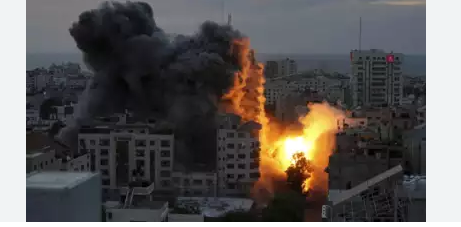Gaza (Web Desk/Agencies): Israel has carried out its most extensive airstrikes on Gaza since January, resulting in at least 326 Palestinian deaths, according to the Gaza Health Ministry.
The strikes, directed by Prime Minister Benjamin Netanyahu and Defense Minister Israel Katz, targeted multiple areas across Gaza, including Gaza City, Rafah, and Khan Younis. These attacks occurred while many civilians were observing the pre-dawn meal during the month of Ramadan.
Medical sources reported that at least 326 people were killed, with 154 casualties in northern Gaza.
The escalation followed Israel's inability to reach an agreement on extending the ceasefire with Hamas. Israeli officials blamed Hamas for rejecting proposals brokered by the United States.
However, Hamas accused Israel of undermining the ceasefire negotiations, claiming that Israel sabotaged the peace efforts intentionally and put the remaining Israeli hostages at risk.
Among those killed in the bombing was Mahmoud Abu Wafah, Gaza’s deputy interior minister and a senior security official.
According to Gaza’s health ministry, the majority of the fatalities were civilians, including women, children, and elderly individuals. The Israeli government has stated that the airstrikes were a retaliation for Hamas’s refusal to accept US-mediated proposals.
The White House confirmed that Israel consulted with the US government before proceeding with the attack.
While Hamas has not yet officially declared the truce over, they have called on international mediators and the United Nations to step in, condemning the strikes as a "severe betrayal."
Hamas also warned of serious consequences for the remaining Israeli hostages should the violence persist.
The situation in Gaza has continued to worsen as Israel's blockade reaches its 16th day. The siege has left the population of Gaza, now numbering 2.1 million, facing severe shortages of food, medicine, and fuel.
Most of the population has been displaced multiple times, and over 70% of Gaza’s infrastructure has been destroyed or damaged. Basic services, including water and sanitation, have collapsed, and hospitals are overwhelmed.
According to Gaza's civil defense agency, at least 121 people were killed in the airstrikes on Tuesday alone, with an additional 150 injured. Witnesses described the bombardment as an unrelenting assault by more than 20 Israeli warplanes.
The initial ceasefire agreement, brokered by Qatar, Egypt, and the US, began on January 19 but collapsed in early March after Israel refused to proceed with the second phase of talks.
Hamas has consistently demanded the complete withdrawal of Israeli forces from Gaza and the establishment of a lasting ceasefire.
In contrast, Israel has insisted that any peace agreement must include the full disarmament of Gaza and the removal of Hamas from power—conditions Palestinians view as unacceptable.
The US’s special envoy, Steve Witkoff, had proposed a "bridge deal" that would involve releasing five Israeli hostages, including Israeli-American Edan Alexander, in exchange for a significant number of Palestinian prisoners held by Israel.
While Hamas agreed to release Alexander along with the remains of other Israeli hostages, Israeli officials rejected Hamas’s response, calling it “unacceptable” and further deepening the stalemate.
Since the outbreak of hostilities on October 7, 2023, more than 48,500 Palestinians, most of them civilians, have been killed, according to the Gaza Health Ministry.
The ongoing blockade and military operations have triggered an unprecedented humanitarian crisis.
Despite rising international calls for peace, Israel has vowed to continue its military operations, stating it will persist for as long as necessary.


